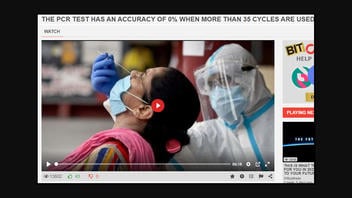
Do PCR tests have an accuracy of 0% when more than 35 amplification cycles are used? No, that's not true: Multiple infectious disease experts confirm polymerase chain reaction (PCR) tests for SARS-CoV-2, the virus that causes COVID-19, accurately confirm the presence of the virus. At higher cycle thresholds, the virus may not be viable and a patient may not be infectious, but that doesn't mean the patient doesn't have the disease. The PCR test is the most widely used and trusted test for diagnosing COVID-19.
The claim appeared in a video post (archived here) hosted on BitChute on December 25, 2020. The post was titled "The PCR TEST HAS AN ACCURACY OF 0% WHEN MORE THAN 35 CYCLES ARE USED." The video opened with a narrator saying:
The PCR test is the most commonly used test for COVID-19 worldwide. Positive tests from PCR have created a statistic of rising cases globally that serves as the premise for continued lockdowns and other measures.
Users on social media saw this title, description and thumbnail:
The PCR TEST HAS AN ACCURACY OF 0% when more than 35 cycles are used
https://odysee.com/@Vaccines:4/The-PCR-TEST-HAS-AN-ACCURACY-OF-0--when-more-than-35-cycles-are-used-!--:c
For the purpose of this fact-check, it's important to understand how the PCR test works. The bio sample from a patient's test swap is subjected to a chemical and thermal process that replicates the genetic material in the sample. Each cycle doubles the amount of the target nucleic acid, in this case, those specific to the novel coronavirus. The number of cycles needed to detect the virus is called the cycle threshold. It indicates at what point the target nucleic acid is detectable in the amplification process. The greater the number of cycles, the higher the sensitivity of the test.
Although the correlation is not perfect, in general, the fewer cycles required, the greater the viral load. The opposite would also be true. The more cycles required, the lower the viral load and some early research suggests higher viral loads correlate to more severe symptoms. The PCR test for COVID-19 is qualitative, meaning that it only gives a yes-no answer: infected or not infected.
The problem with the post is that it conflates the test's capacity to confirm an infection with its capacity to say whether a patient is infectious. Someone may very well test positive for COVID-19 and not be contagious. At high cycle thresholds, patients are less likely to spread the disease to others. But, again, that does not mean that they don't have it and that the test is not accurate.
Lead Stories reached out to Dr. Bobbi Pritt, chair of the division of clinical microbiology at Mayo Clinic, to help explain testing and cycle thresholds. Here's what she said about the post:
To say that there is a zero accuracy, that implies that the answer is wrong. Accuracy refers to whether it's right or wrong, like if I tell you it's a positive test and you don't have disease, then that would be a wrong statement.
But if you have a PCR result that has a cycle threshold above 35, let's say, that doesn't mean it's wrong, it just means that the virus is present in very low levels.
The post included a clip from Dr. Anthony Fauci, the nation's top infectious disease expert. In the video, he talked about the extremely low likelihood of the virus being viable when the cycle threshold is high. His comments were taken out of context to say that tests are not accurate. You can watch the whole video here. Again, here's Pritt:
Those really high cycle threshold numbers may indicate people who are no longer infectious to others, but it doesn't mean that they don't have the virus.
There's some debate in the medical community about the appropriate weight of cycle thresholds. But there's agreement on the fact that the PCR test is the most widely used and trusted test for diagnosing COVID-19.
The main advantage of the PCR test is its reliability, according to the Cleveland Clinic, which wrote:
It is the most accurate test available for COVID-19 detection.
Its main disadvantage, according to the Cleveland Clinic, is that the test detects very small amounts of the virus, even when a person is not contagious, as might be the case once a patient has recovered.
Dr. Marie Landry, director of the Clinical Virology Laboratory at Yale New Haven Hospital, offered the following explanation:
Studies have shown that SARS CoV-2 usually cannot be cultured if the cycle threshold is >33. Therefore, it is likely not transmissible to others if Ct >33. It does not mean the PCR is not accurate. The PCR is detecting a low level of viral RNA.
She added:
The vast majority of PCR results are accurate, including the very low positives.
Landry and Pritt both mentioned one caveat, which is that no test is perfect. PCR tests -- like all tests -- can produce false positives. Among other reasons, this may be because of poor test design, technical factors and a lack of expertise in performing the test.

















